BIO
-
 KAIST College of Life Sciences and Bioengineering Signs MOU with Harvard
KAIST’s College of Life Sciences and Bioengineering recently signed a memorandum of understanding (MOU) with Harvard University’s Center for Brain Science on July 20, which will allow for joint research and exchange in researchers between the two institutions.
Headed by Director Kenneth Blum, Harvard’s Center for Brain Science leads the world in brain-related research. The new MOU will allow for research cooperation, exchanges of professors, researchers, and students, joint usage of infrastructure and research materials, and finally, sharing of research assignments.
The Dean of the College of Life Sciences and Bioengineering Sang Yup Lee, who concerted efforts to form the MOU said, “This agreement will bring together two of the world’s leading brain-related research teams, and I hope that combining their expertise will bring great advances in brain science and engineering.
KAIST’s College of Life Science and Bioengineering, which is known for its creative interdisciplinary research, is producing exemplary research results in the field of brain science from its Biological Sciences and Bio and Brain Engineering departments.
In addition to cooperation with Harvard, KAIST has also formed partnerships with Emory University, Japan’s RIKEN Brain Institute, and Germany’s Max Planck Institute. Not only does it have a worldwide network pertaining to brain research, but KAIST has also engaged in cooperative research with prominent domestic institutions such as, Asan Medical Center, the Korea Research Institute of Bioscience and Biotechnology, the Korea Research Institute of Standards and Science, and the SK Corporation. Through these connections, KAIST has managed to lead in mutually cooperative brain interdisciplinary research.
2009.08.10 View 19336
KAIST College of Life Sciences and Bioengineering Signs MOU with Harvard
KAIST’s College of Life Sciences and Bioengineering recently signed a memorandum of understanding (MOU) with Harvard University’s Center for Brain Science on July 20, which will allow for joint research and exchange in researchers between the two institutions.
Headed by Director Kenneth Blum, Harvard’s Center for Brain Science leads the world in brain-related research. The new MOU will allow for research cooperation, exchanges of professors, researchers, and students, joint usage of infrastructure and research materials, and finally, sharing of research assignments.
The Dean of the College of Life Sciences and Bioengineering Sang Yup Lee, who concerted efforts to form the MOU said, “This agreement will bring together two of the world’s leading brain-related research teams, and I hope that combining their expertise will bring great advances in brain science and engineering.
KAIST’s College of Life Science and Bioengineering, which is known for its creative interdisciplinary research, is producing exemplary research results in the field of brain science from its Biological Sciences and Bio and Brain Engineering departments.
In addition to cooperation with Harvard, KAIST has also formed partnerships with Emory University, Japan’s RIKEN Brain Institute, and Germany’s Max Planck Institute. Not only does it have a worldwide network pertaining to brain research, but KAIST has also engaged in cooperative research with prominent domestic institutions such as, Asan Medical Center, the Korea Research Institute of Bioscience and Biotechnology, the Korea Research Institute of Standards and Science, and the SK Corporation. Through these connections, KAIST has managed to lead in mutually cooperative brain interdisciplinary research.
2009.08.10 View 19336 -
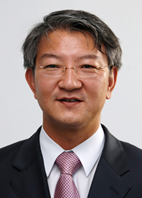 KAIST Professor Sang-Yup Lee Chair of International Metabolic Engineering Conference Due Next Year
KAIST distinguished professor Sang-Yup Lee was named to chair the 17th Metabolic Engineering Conference which will convene on Jeju Island, Korea, next year, under the theme of "Metabolic Engineering for Green Growth." It was decided at the 16th Biochemical Engineering Conference held in Burlington, Vermont, on July 5-9.
Metabolic Engineering Conference in 2010 will not only involve presentations and discussions about metabolic engineering, but will inaugurate the “World Council on Industrial Biotechnology,” which will bring together global corporations and the world’s experts in industrial biochemical engineering, according to sources at KAIST.
A KAIST official commented, “The fact that the Metabolic Engineering Conference is to be held here [in Korea] proves that Korea is being acknowledged as a key player in this field.”
As the world faces the depletion of fossil fuels and environmental pollution, nations are showing increasing interest in industrial biochemical alternatives, such as microscopic organisms or new chemicals, to solve their problems. In addition, efficient production of biochemical materials and bio-fuels using microbes is deemed vital for the future.
“The Korean government has become a model to other countries thanks to its leadership in carrying out the ‘Green Growth’ policy,” Professor Sang-Yup Lee said. He stated that KAIST is recognized for its research in advanced biochemical material and fuel production methods.
“Green Growth,” a concept first developed by ESCAP, the UN agency working for social and economic cooperation in Asia and the Pacific, aims to achieve sustainable economic growth without destroying the environment.
Ref. Department of Biochemical Engineering, Metabolic and BioMolecular Engineering Lab, KAIST
2009.07.17 View 15321
KAIST Professor Sang-Yup Lee Chair of International Metabolic Engineering Conference Due Next Year
KAIST distinguished professor Sang-Yup Lee was named to chair the 17th Metabolic Engineering Conference which will convene on Jeju Island, Korea, next year, under the theme of "Metabolic Engineering for Green Growth." It was decided at the 16th Biochemical Engineering Conference held in Burlington, Vermont, on July 5-9.
Metabolic Engineering Conference in 2010 will not only involve presentations and discussions about metabolic engineering, but will inaugurate the “World Council on Industrial Biotechnology,” which will bring together global corporations and the world’s experts in industrial biochemical engineering, according to sources at KAIST.
A KAIST official commented, “The fact that the Metabolic Engineering Conference is to be held here [in Korea] proves that Korea is being acknowledged as a key player in this field.”
As the world faces the depletion of fossil fuels and environmental pollution, nations are showing increasing interest in industrial biochemical alternatives, such as microscopic organisms or new chemicals, to solve their problems. In addition, efficient production of biochemical materials and bio-fuels using microbes is deemed vital for the future.
“The Korean government has become a model to other countries thanks to its leadership in carrying out the ‘Green Growth’ policy,” Professor Sang-Yup Lee said. He stated that KAIST is recognized for its research in advanced biochemical material and fuel production methods.
“Green Growth,” a concept first developed by ESCAP, the UN agency working for social and economic cooperation in Asia and the Pacific, aims to achieve sustainable economic growth without destroying the environment.
Ref. Department of Biochemical Engineering, Metabolic and BioMolecular Engineering Lab, KAIST
2009.07.17 View 15321 -
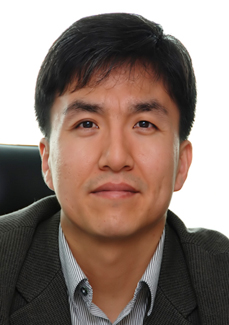 Prof. Cho Appointed Editor-in-Chief of Systems Biology Encyclopedia
Prof. Kwang-Hyun Cho of the Department of Bio and Brain Engineering, KAIST, has been appointed as the editor-in-chief of the Encyclopedia of Systems Biology which is currently in development by Springer, a New York-based publishing company, university authorities said on Monday (July 6).
Prof. Cho will share the position with three other eminent scholars from Britain, Germany and the United States. Cho will be responsible for selecting editorial members for each section of the Encyclopedia and overseeing the overall editorial process.
The Encyclopedia of Systems Biology is a multi-volume reference compilation of the research outcomes in the field of systems biology all over the world. The ESB will consist of alphabetically ordered description of systems biology concepts and is envisaged to ultimately comprise 6-12 volumes. Publication of the Encyclopedia is scheduled for 2011.
2009.07.08 View 15393
Prof. Cho Appointed Editor-in-Chief of Systems Biology Encyclopedia
Prof. Kwang-Hyun Cho of the Department of Bio and Brain Engineering, KAIST, has been appointed as the editor-in-chief of the Encyclopedia of Systems Biology which is currently in development by Springer, a New York-based publishing company, university authorities said on Monday (July 6).
Prof. Cho will share the position with three other eminent scholars from Britain, Germany and the United States. Cho will be responsible for selecting editorial members for each section of the Encyclopedia and overseeing the overall editorial process.
The Encyclopedia of Systems Biology is a multi-volume reference compilation of the research outcomes in the field of systems biology all over the world. The ESB will consist of alphabetically ordered description of systems biology concepts and is envisaged to ultimately comprise 6-12 volumes. Publication of the Encyclopedia is scheduled for 2011.
2009.07.08 View 15393 -
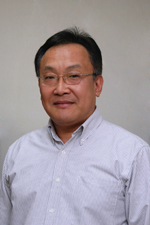 KAIST Prof. Park Selected as Winner of Clemson Award
Professor Tae-Gwan Park of the Department of Biological Sciences, KAIST, was chosen as the winner of the 2009 Clemson Award for Fundamental Research, university authorities said on Tuesday (April 7).
The award is the highest recognition of the Society for Biomaterials, an international organization of more than 3,000 members that promotes research in the field of biomaterials. Prof. Park is cited for his outstanding achievements in interdisciplinary research covering gene transferring, gene therapy and neogenesis. It is rare for a non-U.S. national to win the prize in the 36-year history of the award.
The award will be given to Professor Park at the Annual Meeting of the society which will be held in San Antonio, Texas, on April 22.
2009.04.09 View 14458
KAIST Prof. Park Selected as Winner of Clemson Award
Professor Tae-Gwan Park of the Department of Biological Sciences, KAIST, was chosen as the winner of the 2009 Clemson Award for Fundamental Research, university authorities said on Tuesday (April 7).
The award is the highest recognition of the Society for Biomaterials, an international organization of more than 3,000 members that promotes research in the field of biomaterials. Prof. Park is cited for his outstanding achievements in interdisciplinary research covering gene transferring, gene therapy and neogenesis. It is rare for a non-U.S. national to win the prize in the 36-year history of the award.
The award will be given to Professor Park at the Annual Meeting of the society which will be held in San Antonio, Texas, on April 22.
2009.04.09 View 14458 -
 Workshop on Biomedical IC to Be Held on March 26
KAIST will hold a workshop on "biomedical IC for future healthcare system" on March 26 at a lecture room of the School of Electrical Engineering & Computer Science. The workshop is organized by SEECS and the Korean Institute of Next Generation Computing.
At the workshop, a variety of new technologies expected to expedite the development of biomedical systems will be presented. KAIST Prof. Hoi-Jun Yoo will speak on the "body channel communication" using the human body as the signal transmission medium and Dr. Seung-Hwan Kim of Electronics and Telecommunications Research Institute (ETRI) on a wearable vital sign monitoring system.
Other subjects are CMOS (complementary metal-oxide semiconductor) fully electronic biosensor for biomolecular detection to be presented by KAIST Prof. Gyu-Hyeong Cho; nerve interface and IC (integrated circuit) system design by KAIST Prof. Yoon-gi Nam; design of neural recording and stimulation IC using time-varying magnetic field by KAIST Prof. Seong-Hwan Cho; low power multi-core digital signal processor for hearing aid by Dong-Wook Kim, senior researcher at the Samsung Advanced Institute of Technology; and a non-contact cardiac sensor by KAIST Prof. Seung-Chul Hong.
With the advent of the ageing society, medical expenses of the elderly people are rapidly increasing. As a way to address the issue, interests are growing in "ubiquitous healthcare," a technology that uses a large number of environmental and patient sensors and actuators to monitor and improve patients’ physical and mental condition.
The upcoming workshop is the first academic event on biomedical integrated chips to be held in Korea. The workshop will provide a valuable opportunity for experts in biomedical area to get together and examine the present status of Korean biomedical area and discuss about its future, KAIST officials said.
2009.03.20 View 21220
Workshop on Biomedical IC to Be Held on March 26
KAIST will hold a workshop on "biomedical IC for future healthcare system" on March 26 at a lecture room of the School of Electrical Engineering & Computer Science. The workshop is organized by SEECS and the Korean Institute of Next Generation Computing.
At the workshop, a variety of new technologies expected to expedite the development of biomedical systems will be presented. KAIST Prof. Hoi-Jun Yoo will speak on the "body channel communication" using the human body as the signal transmission medium and Dr. Seung-Hwan Kim of Electronics and Telecommunications Research Institute (ETRI) on a wearable vital sign monitoring system.
Other subjects are CMOS (complementary metal-oxide semiconductor) fully electronic biosensor for biomolecular detection to be presented by KAIST Prof. Gyu-Hyeong Cho; nerve interface and IC (integrated circuit) system design by KAIST Prof. Yoon-gi Nam; design of neural recording and stimulation IC using time-varying magnetic field by KAIST Prof. Seong-Hwan Cho; low power multi-core digital signal processor for hearing aid by Dong-Wook Kim, senior researcher at the Samsung Advanced Institute of Technology; and a non-contact cardiac sensor by KAIST Prof. Seung-Chul Hong.
With the advent of the ageing society, medical expenses of the elderly people are rapidly increasing. As a way to address the issue, interests are growing in "ubiquitous healthcare," a technology that uses a large number of environmental and patient sensors and actuators to monitor and improve patients’ physical and mental condition.
The upcoming workshop is the first academic event on biomedical integrated chips to be held in Korea. The workshop will provide a valuable opportunity for experts in biomedical area to get together and examine the present status of Korean biomedical area and discuss about its future, KAIST officials said.
2009.03.20 View 21220 -
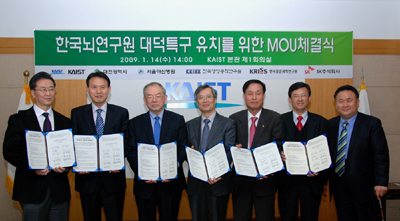 Six Organizations Join Forces to Induce Projected National Brain Institute to Daejeon
Six major organizations including KAIST have joined forces to help Daejeon City to win the government approval to build the envisioned Korean Brain Institute in Daedeok Research Complex.
The six organizations signed a memorandum of understanding on cooperating in establishing the government-funded institute built within the Daedeok Research Complex in the city of Daejeon, at KAIST on Jan. 14. The six organizations are KAIST, the Daejeon City Government, Korea Research Institute of Bioscience and Biotechnology, Korea Research Institute of Standard and Science, Asan Medical Center, and SK Corp., a pioneer in effective therapeutic invention for serious brain disorders.
The partnership of the six organizations is expected to bring a broad-based cooperation opportunities and create a massive synergy effect in the brain science researches and the development of new therapeutic treatment for brain disorders by combining their resources and infrastructures.
The six organizations have also built an international research network with such globally-renowned brain research institutions as RIKEN, a large natural sciences research institute in Japan, Max Plank Institute in Germany, Federal Institute of Technology, Lausanne, in Switzerland and Brain Research Institute of University of Queensland in Australia. The research network is under the support and guidance of Dennis Choi, a prominent neuroscientist who once served as the President of the Society for Neuroscience and is currently a professor in the Departments of Neurology and biology at Emory University.
The tentatively titled Korea Brain Institute is envisioned to help fight brain disorders and create Korea"s new growth engine, as well as lengthening life span, by conducting convergence researches in nero science, brain science and pharmacology. If the consortium of the six organizations wins the government approval to build the proposed institute within the Daedeok complex, the central government and the Daejeon city government are expected to pour a total of 329.7 billion won into the project by 2020.
2009.01.14 View 20448
Six Organizations Join Forces to Induce Projected National Brain Institute to Daejeon
Six major organizations including KAIST have joined forces to help Daejeon City to win the government approval to build the envisioned Korean Brain Institute in Daedeok Research Complex.
The six organizations signed a memorandum of understanding on cooperating in establishing the government-funded institute built within the Daedeok Research Complex in the city of Daejeon, at KAIST on Jan. 14. The six organizations are KAIST, the Daejeon City Government, Korea Research Institute of Bioscience and Biotechnology, Korea Research Institute of Standard and Science, Asan Medical Center, and SK Corp., a pioneer in effective therapeutic invention for serious brain disorders.
The partnership of the six organizations is expected to bring a broad-based cooperation opportunities and create a massive synergy effect in the brain science researches and the development of new therapeutic treatment for brain disorders by combining their resources and infrastructures.
The six organizations have also built an international research network with such globally-renowned brain research institutions as RIKEN, a large natural sciences research institute in Japan, Max Plank Institute in Germany, Federal Institute of Technology, Lausanne, in Switzerland and Brain Research Institute of University of Queensland in Australia. The research network is under the support and guidance of Dennis Choi, a prominent neuroscientist who once served as the President of the Society for Neuroscience and is currently a professor in the Departments of Neurology and biology at Emory University.
The tentatively titled Korea Brain Institute is envisioned to help fight brain disorders and create Korea"s new growth engine, as well as lengthening life span, by conducting convergence researches in nero science, brain science and pharmacology. If the consortium of the six organizations wins the government approval to build the proposed institute within the Daedeok complex, the central government and the Daejeon city government are expected to pour a total of 329.7 billion won into the project by 2020.
2009.01.14 View 20448 -
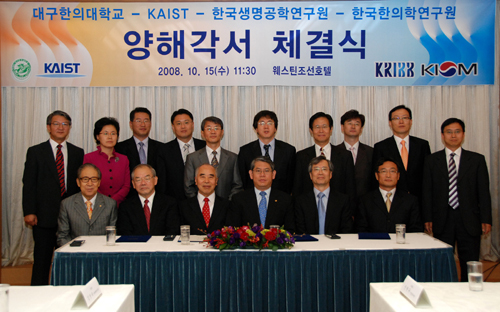 KAIST, KRIBB Agree to Cooperate in Research of Convergence Technologies
Oct. 15, 2008 -- KAIST and Korea Research Institute of Bioscience and Biotechnology (KRIBB) have agreed to cooperate in the research of convergence fields of biotechnology, information technology and nanotechnology.
To this end, the two institutions concluded a memorandum of understanding to create a new academia-institute cooperative model in the convergence fields on Oct. 15 in Seoul, with KAIST President Nam-Pyo Suh, KRIBB Director Young-Hoon Park and Vice Minister of Education, Science and Technology Jong-Koo Park in attendance.
Under the agreement, the two institutions will set up the tentatively-named KAIST-KRIBB BINT Convergence Institute for the development of technologies and nurturing skilled manpower in the convergence fields.
The partnership of the two institutions is expected to bring broad-based cooperation opportunities and create a massive synergy effect by combining their resources and infrastructure for the development of convergence technologies, KAIST officials said..
The proposed institute is also designed to build a world-class research hub in systems biotechnology by combining strengths of the two institutions with initiatives to achieve the Korean government"s new vision for "low carbon, green growth."
The institute will also serve as a base for domestic brain convergence by concentrating the nation"s research capacities in genetics and brain technology.
KAIST also signed a memorandum of understanding for cooperation in researches in Oriental medicine with three institutions, KRIBB, Daegu Hanny University and Korea Institute of Oriental Medicine.
The agreement calls for the four institutions to conduct joint researches in traditional sciences and Oriental medicine based on systems biology, develop manpower in related fields and share academic and research information.
The agreement is expected to provide impetus to reinforcing competitiveness in compound and convergence technologies and discover new properties in Oriental medicine, according to KAIST authorities.
2008.10.16 View 18960
KAIST, KRIBB Agree to Cooperate in Research of Convergence Technologies
Oct. 15, 2008 -- KAIST and Korea Research Institute of Bioscience and Biotechnology (KRIBB) have agreed to cooperate in the research of convergence fields of biotechnology, information technology and nanotechnology.
To this end, the two institutions concluded a memorandum of understanding to create a new academia-institute cooperative model in the convergence fields on Oct. 15 in Seoul, with KAIST President Nam-Pyo Suh, KRIBB Director Young-Hoon Park and Vice Minister of Education, Science and Technology Jong-Koo Park in attendance.
Under the agreement, the two institutions will set up the tentatively-named KAIST-KRIBB BINT Convergence Institute for the development of technologies and nurturing skilled manpower in the convergence fields.
The partnership of the two institutions is expected to bring broad-based cooperation opportunities and create a massive synergy effect by combining their resources and infrastructure for the development of convergence technologies, KAIST officials said..
The proposed institute is also designed to build a world-class research hub in systems biotechnology by combining strengths of the two institutions with initiatives to achieve the Korean government"s new vision for "low carbon, green growth."
The institute will also serve as a base for domestic brain convergence by concentrating the nation"s research capacities in genetics and brain technology.
KAIST also signed a memorandum of understanding for cooperation in researches in Oriental medicine with three institutions, KRIBB, Daegu Hanny University and Korea Institute of Oriental Medicine.
The agreement calls for the four institutions to conduct joint researches in traditional sciences and Oriental medicine based on systems biology, develop manpower in related fields and share academic and research information.
The agreement is expected to provide impetus to reinforcing competitiveness in compound and convergence technologies and discover new properties in Oriental medicine, according to KAIST authorities.
2008.10.16 View 18960 -
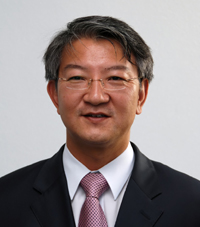 Prof. Lee Appointed to Advisory Board of the U.S. Joint BioEnergy Institute
Prof. Sang-Yup Lee of the Department of Chemical and Biomolecular Engineering, KAIST, has been appointed as a member of the scientific advisory board of the Joint BioEnergy Institute under the wing of the U.S. Department of Energy, university authorities said on Monday (Aug. 4).
The Joint BioEnergy Institute (JBEI) is a scientific partnership in the San Francisco Bay area, California, led by Lawrence Berkeley National Laboratory (Berkeley Lab). Its partner organizations include the Sandia National Laboratories, the University of California in Berkeley, UC Davis, the Carnegie Institution for Science and the Lawrence Livermore National Laboratory.
JBEI
2008.08.07 View 14511
Prof. Lee Appointed to Advisory Board of the U.S. Joint BioEnergy Institute
Prof. Sang-Yup Lee of the Department of Chemical and Biomolecular Engineering, KAIST, has been appointed as a member of the scientific advisory board of the Joint BioEnergy Institute under the wing of the U.S. Department of Energy, university authorities said on Monday (Aug. 4).
The Joint BioEnergy Institute (JBEI) is a scientific partnership in the San Francisco Bay area, California, led by Lawrence Berkeley National Laboratory (Berkeley Lab). Its partner organizations include the Sandia National Laboratories, the University of California in Berkeley, UC Davis, the Carnegie Institution for Science and the Lawrence Livermore National Laboratory.
JBEI
2008.08.07 View 14511 -
 KAIST Professors Article Featured as Cover Thesis of Biotechnology Journal
An article authored by a research team of Prof. Sang-yup Lee at the Department of Chemical and Biomolecular Engineering and Dr. Jin-Hwan Park at the KAIST Institute for the BioCentury has been featured as the cover thesis of the August 2008 issue of Trends in Biotechnology.
The paper, titled "General strategy for strain improvement by means of systems metabolic engineering," focuses on the application of systems biology for the development of strains and illustrates future prospects. Trends in Biotechnology, published by Cell Press, is one of the most prestigious review journals in the field.
Jin-Hwan Park, the primary author of the research thesis, said that the KAIST team"s research work was expected to provide substantial help to researchers involved in biotechnology industry.
The strategy has been established on the basis of the experiences gained in the actual microbial production process using the systems biology methods which his research team has recently worked on, Prof. Park said.
2008.07.24 View 18108
KAIST Professors Article Featured as Cover Thesis of Biotechnology Journal
An article authored by a research team of Prof. Sang-yup Lee at the Department of Chemical and Biomolecular Engineering and Dr. Jin-Hwan Park at the KAIST Institute for the BioCentury has been featured as the cover thesis of the August 2008 issue of Trends in Biotechnology.
The paper, titled "General strategy for strain improvement by means of systems metabolic engineering," focuses on the application of systems biology for the development of strains and illustrates future prospects. Trends in Biotechnology, published by Cell Press, is one of the most prestigious review journals in the field.
Jin-Hwan Park, the primary author of the research thesis, said that the KAIST team"s research work was expected to provide substantial help to researchers involved in biotechnology industry.
The strategy has been established on the basis of the experiences gained in the actual microbial production process using the systems biology methods which his research team has recently worked on, Prof. Park said.
2008.07.24 View 18108 -
 KAIST Professor Named International Research Grant Reviewer
Prof. Kwang-Hyun Cho of the Department of Bio and Brain Engineering, KAIST, was appointed as a research grant review committee member of the international Human Frontier Science Program (HFSP) for 2008-2009, university authorities reported.
The HFSP is a funding agency that supports international collaboration in interdisciplinary, basic research in the life sciences. It was initiated in 1989 by G7 countries as the sole funding program for international researches in neuroscience and molecular biology. The HFSP now has a membership of 35 countries and Korea joined the program in 2004. Prof. Cho will be responsible for reviewing grant applications in the field of systems biology.
Prof. Cho received B.S., M.S. and Ph.D. degrees in electrical engineering from KAIST in 1993, 1995, and 1998, respectively. He has been working as a director of the KAIST Institute for the BioCentury and KAIST"s Laboratory for Systems Biology and Bio-Inspired Engineering. He has been serving on editorial advisory boards of various international science journals, including Systems and Synthetic Biology (Springer, Netherlands, from 2006), BMC Systems Biology (BMC, London, U.K., from 2007) and Gene Regulation and Systems Biology (Libertas Academica, New Zealand, from 2007).
He is a senior member of the Engineering in Medicine and Biology Society (EMBS) affiliated with the Institute of Electronics and Electrical Engineers (IEEE). His research interests cover the areas of systems science with bio-medical applications, especially systems biology and bio-inspired engineering based on molecular systems biology.
2008.07.18 View 22064
KAIST Professor Named International Research Grant Reviewer
Prof. Kwang-Hyun Cho of the Department of Bio and Brain Engineering, KAIST, was appointed as a research grant review committee member of the international Human Frontier Science Program (HFSP) for 2008-2009, university authorities reported.
The HFSP is a funding agency that supports international collaboration in interdisciplinary, basic research in the life sciences. It was initiated in 1989 by G7 countries as the sole funding program for international researches in neuroscience and molecular biology. The HFSP now has a membership of 35 countries and Korea joined the program in 2004. Prof. Cho will be responsible for reviewing grant applications in the field of systems biology.
Prof. Cho received B.S., M.S. and Ph.D. degrees in electrical engineering from KAIST in 1993, 1995, and 1998, respectively. He has been working as a director of the KAIST Institute for the BioCentury and KAIST"s Laboratory for Systems Biology and Bio-Inspired Engineering. He has been serving on editorial advisory boards of various international science journals, including Systems and Synthetic Biology (Springer, Netherlands, from 2006), BMC Systems Biology (BMC, London, U.K., from 2007) and Gene Regulation and Systems Biology (Libertas Academica, New Zealand, from 2007).
He is a senior member of the Engineering in Medicine and Biology Society (EMBS) affiliated with the Institute of Electronics and Electrical Engineers (IEEE). His research interests cover the areas of systems science with bio-medical applications, especially systems biology and bio-inspired engineering based on molecular systems biology.
2008.07.18 View 22064 -
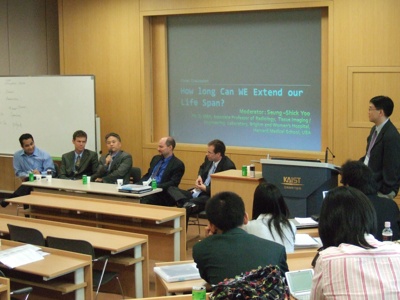 Int'l Conference for Integration of Science & Technology into Society Opens
The 2008 International Conference for the Integration of Science and Technology into Society (ICISTS-KAIST) opened a four-day meeting on Tuesday (July 15) at Daejeon KAIST campus. The conference is an annual event organized by a group of KAIST undergraduate students.
The fifth-year gathering is designed to provide participants with an opportunity to broaden their scientific perspectives by sharing ideas and experiences in related topics, as well as building an international human network. This year"s event has drawn about 200 students from 40 countries.
The centerpiece of the conference is three workshops on the following themes; Human-Robot Symbiotic Society, Neo-brain Science and Trafficmatics. Myung-Ja Kim, former Korean Environment Minister, will appear as a keynote speaker.
In the workshop sessions, two speakers will discuss specific issues and arrive at a tentative conclusion. Participants will have the opportunity to participate in the debate through Q&A for each session.
The first theme "Human-Robot Symbiotic Society" delves into the current trend that robot is being transformed into a perceivable and touchable concept from an abstract one. Guests for the workship include June-Ho Oh, professor at the Department of Mechanical Engineering, KAIST; James Dater, professor at the Department of Political Science, University of Hawaii at Manoa, and Director of the Hawaii Research Center for Future; Michael Pollitt, CEO of Shadow Robot Company; and Steven Dubowsky, professor at the Department of Mechanical Engineering, MIT.
The second theme "Neo-Brain Science" focuses on attempts to shed light on brain from diverse perspectives including psychology, economics and art. Among invited speakers are Prof. Jai-Seung Jung at the Department of Bio and Brain Engineering, KAIST; Prof. Un-Jung Kang at the University of Chicago Medical Center; and Peter Geyer, a consultant for the Association for Psychological Type.
The third workshop on "Traffimatics" will deal with "intelligent transport systems (ITS)" which will discusst new paradigm in transportation policy and traffic engineering. On the list of speakers are Assaf Biderman, assistant director, SENSEable City Laboratory, MIT; Prof. Richard Tay, at the Department of Civil Engineering, University of Calgary; Prof. Shoshi Mizokami at Kumamoto University; and Ho-Jong Baik, research associate professor of Virginia Tech.
2008.07.16 View 22867
Int'l Conference for Integration of Science & Technology into Society Opens
The 2008 International Conference for the Integration of Science and Technology into Society (ICISTS-KAIST) opened a four-day meeting on Tuesday (July 15) at Daejeon KAIST campus. The conference is an annual event organized by a group of KAIST undergraduate students.
The fifth-year gathering is designed to provide participants with an opportunity to broaden their scientific perspectives by sharing ideas and experiences in related topics, as well as building an international human network. This year"s event has drawn about 200 students from 40 countries.
The centerpiece of the conference is three workshops on the following themes; Human-Robot Symbiotic Society, Neo-brain Science and Trafficmatics. Myung-Ja Kim, former Korean Environment Minister, will appear as a keynote speaker.
In the workshop sessions, two speakers will discuss specific issues and arrive at a tentative conclusion. Participants will have the opportunity to participate in the debate through Q&A for each session.
The first theme "Human-Robot Symbiotic Society" delves into the current trend that robot is being transformed into a perceivable and touchable concept from an abstract one. Guests for the workship include June-Ho Oh, professor at the Department of Mechanical Engineering, KAIST; James Dater, professor at the Department of Political Science, University of Hawaii at Manoa, and Director of the Hawaii Research Center for Future; Michael Pollitt, CEO of Shadow Robot Company; and Steven Dubowsky, professor at the Department of Mechanical Engineering, MIT.
The second theme "Neo-Brain Science" focuses on attempts to shed light on brain from diverse perspectives including psychology, economics and art. Among invited speakers are Prof. Jai-Seung Jung at the Department of Bio and Brain Engineering, KAIST; Prof. Un-Jung Kang at the University of Chicago Medical Center; and Peter Geyer, a consultant for the Association for Psychological Type.
The third workshop on "Traffimatics" will deal with "intelligent transport systems (ITS)" which will discusst new paradigm in transportation policy and traffic engineering. On the list of speakers are Assaf Biderman, assistant director, SENSEable City Laboratory, MIT; Prof. Richard Tay, at the Department of Civil Engineering, University of Calgary; Prof. Shoshi Mizokami at Kumamoto University; and Ho-Jong Baik, research associate professor of Virginia Tech.
2008.07.16 View 22867 -
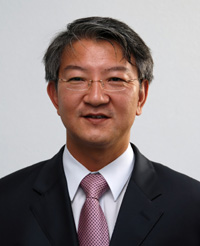 KAIST, GS Caltex Jointly Develop New Bacteria to Produce Biobutanol
KAIST and GS Caltex, Korea"s second-largest refiner, have jointly developed a new strain of bacteria to produce biobutanol, which is regarded as a promising next-generation biofuel, KAIST authorities said on Monday (June 2).
A research team led by Prof. Sang-Yup Lee of the Chemical and Biomolecular Engineering Department and researchers of GS Caltex succeeded in developing an improved strain of bacteria which enables to produce a large amount of biobutanol in the process of fermenting biomass. The research team has applied for international patent for the new technology.
Biomass refers to living and recently dead biological material that can be used as fuel or for industrial production. It usually refers to plant matter grown for use as biofuel, but it also includes plant or animal matter used for production of fibers, chemicals or heat.
In the 1970s and 1980s when scientists began researching the possibilities of alternative fuels, bacteria were used in the process of fermenting biomass. This ABE (acetone, butanol, ethanol) fermentation process yields butanol, acetone, and ethanol in a ratio of 6:3:1, respectively. Acetone produced in this process is not usable.
The newly developed technology to produce biobutanol has an advantage of lowering production cost by eliminating the process to separate acetone from butanol. This has been made possible by improving the bacteria used for the fermentation in metabolic engineering terms, and producing butanol and ethanol only in a ratio of 6:1, while curbing the generation of acetone.
In comparison with bioethanol, also a biofuel mixture which is currently under widespread use in some countries, butanol is more easily transported with gasoline and diesel through pipelines because of its lower tendency to separate from the fuel when contaminated with water. Butanol is also less corrosive than ethanol, another reason its transport through pipeline is preferable.
Global interest in full utilization of biomass and development of other alternative energy including biobutanol has deepened in recent years, as crude oil prices have skyrocketed to record levels and climate changes resulting from the excessive use of fossil fuel have been causing various problems around the world.
2008.06.04 View 14539
KAIST, GS Caltex Jointly Develop New Bacteria to Produce Biobutanol
KAIST and GS Caltex, Korea"s second-largest refiner, have jointly developed a new strain of bacteria to produce biobutanol, which is regarded as a promising next-generation biofuel, KAIST authorities said on Monday (June 2).
A research team led by Prof. Sang-Yup Lee of the Chemical and Biomolecular Engineering Department and researchers of GS Caltex succeeded in developing an improved strain of bacteria which enables to produce a large amount of biobutanol in the process of fermenting biomass. The research team has applied for international patent for the new technology.
Biomass refers to living and recently dead biological material that can be used as fuel or for industrial production. It usually refers to plant matter grown for use as biofuel, but it also includes plant or animal matter used for production of fibers, chemicals or heat.
In the 1970s and 1980s when scientists began researching the possibilities of alternative fuels, bacteria were used in the process of fermenting biomass. This ABE (acetone, butanol, ethanol) fermentation process yields butanol, acetone, and ethanol in a ratio of 6:3:1, respectively. Acetone produced in this process is not usable.
The newly developed technology to produce biobutanol has an advantage of lowering production cost by eliminating the process to separate acetone from butanol. This has been made possible by improving the bacteria used for the fermentation in metabolic engineering terms, and producing butanol and ethanol only in a ratio of 6:1, while curbing the generation of acetone.
In comparison with bioethanol, also a biofuel mixture which is currently under widespread use in some countries, butanol is more easily transported with gasoline and diesel through pipelines because of its lower tendency to separate from the fuel when contaminated with water. Butanol is also less corrosive than ethanol, another reason its transport through pipeline is preferable.
Global interest in full utilization of biomass and development of other alternative energy including biobutanol has deepened in recent years, as crude oil prices have skyrocketed to record levels and climate changes resulting from the excessive use of fossil fuel have been causing various problems around the world.
2008.06.04 View 14539